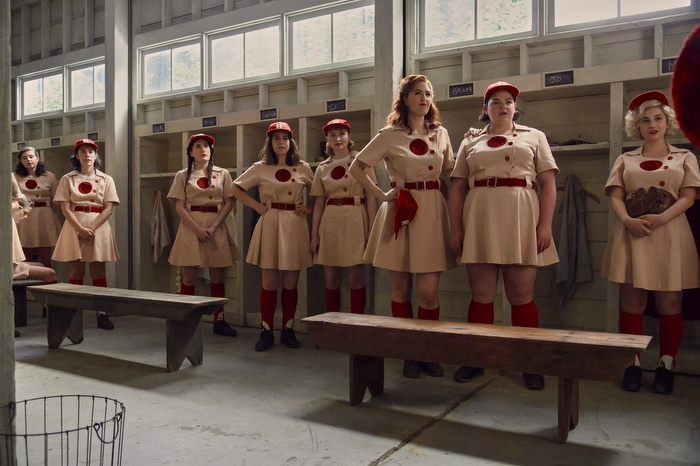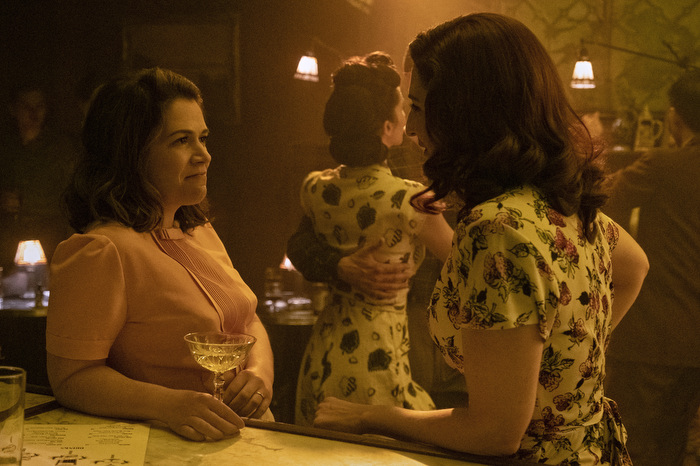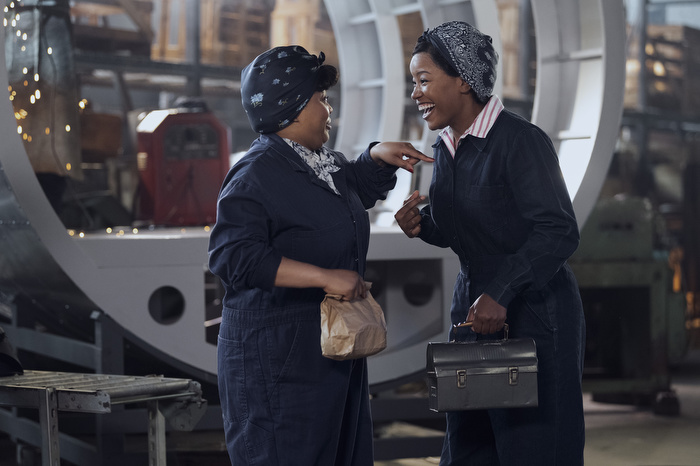“This used to be my playground,” Madonna laments in the hit theme song for A League of Their Own, the classic 1992 film about the All-American Girls Professional Baseball League. It’s a fitting image, if an uncharacteristically tame one by Erotica-era Madonna standards, to attach to what is essentially an outstanding kids’ movie. Stacked with stars including Geena Davis, Tom Hanks, Rosie O’Donnell, and Lori Petty, as well as Queen Madge herself, the original League was a PG-rated chronicle of baseball, friendship, and sibling rivalry amid the sexism of the World War II era. For little girls in the ’90s, this was nothing short of exhilarating. (I should know: I was seven and playing intramural softball, badly, when the movie premiered.) Revisit this playground as an adult, however, and you might find the story a bit incomplete. Where, for instance, are all the lesbians?
A new Amazon series, also titled A League of Their Own, answers that question with relish. Premiering Aug. 12, the historical dramedy from co-creators Will Graham (Mozart in the Jungle) and Broad City star Abbi Jacobson—one presumably aimed at the grown-ups who cherished the film as kids—takes pains to do right by the many queer women on the AAGPBL’s roster. (Maybelle Blair, a 95-year-old former player who consulted on the series, just came out as gay this past June.) It highlights misogynistic details the movie glossed over and offers a glimpse into the experiences of white-passing Latinas in the sport. It also carves out substantial space to represent the Black athletes who were excluded from women’s baseball when the League formed in 1943, four years before Jackie Robinson broke the MLB color barrier. Despite the show’s casually anachronistic dialogue, this heartfelt but overly dutiful revisionism almost works.
Graham and Jacobson’s League comes off as, in equal measure, a reference-packed tribute to and a pointed correction of its predecessor. Although none of the characters in the two versions are exactly the same, protagonist Carson Shaw, played by Jacobson with the same flustered sweetness that made her Broad City alter ego so endearing, is a married country girl like Davis’ Dottie Hinson. The first future Rockford Peaches teammates Carson meets after impulsively hopping a train to Chicago for tryouts are glamorous Greta Gill (The Good Place and Barry breakout D’Arcy Carden) and her gallant sidekick Jo De Luca (Melanie Field, who was so funny in the canceled-too-soon comedy Florida Girls)—two best friends and women of the world who are fairly close analogues for Madonna and Rosie’s characters, respectively, in the movie.

The supporting cast coalesces once the Peaches move into a Rockford boardinghouse, under the tough but tender eye of chaperone Beverly (the great Dale Dickey), and start training with washed-up MLB pitcher turned coach Dove Porter (Nick Offerman, in a less drunkenly incapacitated take on Hanks’ role). And it’s a great ensemble. Roberta Colindrez, who smoldered as Nico on Vida, plays ambitious pitcher Lupe Garcia, who’s saddled with the obligation of translating for Spanish-speaking teammate Esti González (Priscilla Delgado). Molly Ephraim (Perry Mason) brings sweetness and light as platinum-blonde bombshell Maybelle Fox. Comedian Kate Berlant is anxious, self-dramatizing Shirley Cohen, a millennial before her time.
Meanwhile, a parallel story line follows the tenacious Max Chapman (Chanté Adams from Roxanne Roxanne), a Rockford-native pitching prodigy who’s turned away from tryouts because she’s Black. While the Peaches train, Max works in her mother Toni’s (Saidah Arrika Ekulona) beauty salon and plays third wheel to her best friend Clance Morgan (Gbemisola Ikumelo), a comics superfan who draws her own stuff, and the new husband Clance adores, Guy (Aaron Jennings). Rightly confident in her athletic talent, she beseeches team after team to give an extraordinary Black woman a chance. It isn’t easy. Neither is hiding her true self from Toni, a conservative churchgoer who doesn’t speak to her own queer sibling, Bertie (Lea Robinson).
What Carson and Max have in common, besides baseball and gender-neutral names, is that they’re both attracted to women. For Carson—one of the more outwardly feminine members of a team whose owners are desperate to present polished “ladies,” complete with skirted uniforms—this is new information, something she only realizes about herself after falling for the lively but emotionally distant Greta. These emotional stories, along with side plots about some other Peaches’ same-sex exploits and the homophobia they face, make for show that’s just as much a lesbian romantic drama as it is a women’s sports drama. O’Donnell, who came out a decade after League, even makes an appearance as the proprietor of a queer speakeasy.

The performances are endearing enough to offset the season’s familiar, underdogs-chase-glory narrative. Max and Carson make easy heroines to root for, and a retelling of the AAGPBL era that honors the identities, relationships, and desires of the characters’ real-life counterparts is welcome. The women’s frustration, in a world that scorns queerness and ignores gender dysphoria, resonates. “I feel like I’m screwing up my entire life, and I don’t know why,” says Carson, early in her affair with Greta. Convinced that she must choose between marrying a man to keep her family and Clance, and losing them to live as a lesbian, Max vacillates between one heartbreaking option and the other. “Everyone wants me to be some way,” she sighs.
There are a few very funny scenes and lines. In one episode the team’s only lodging option for an away game is a convent (motels at the time had all sorts of alarming ideas about women traveling in groups) and, even in God’s house, roommates Carson and Greta can’t keep their hands off each other. Tasked with delivering the traditional pre-game pep talk, Shirley coaches her teammates to repeat the mantra: “We are not afraid of the inevitability of death!”

But these moments mostly feel like glimpses of the looser, lighter League I wish we’d gotten. Yes, it’s realistic to depict the adversity queer people and women of color faced during the war years, and to show the poor Peaches trying to play while creeps on the bleachers scream things like, “Hey honey, what’s your bra size?” And I’m glad the show doesn’t gloss over that stuff. At the same time, oppression on the basis of identity does not a complete character make. It shouldn’t take nine episodes to find out more about Lupe than that she is queer and Latina.
One issue is the disconnect in tones between the Peaches’ story—which, done right, would be more than enough to fill hour-long episodes—and Max’s equally complicated family drama. Both plots are worthwhile, but they crowd each other out. Which leads to an even bigger problem: with runtime at a premium, Graham and Jacobson rarely find space for fun. I think the fondness so many women who grew up with the movie retain for it has a lot to do with the enjoyment we got out of watching female characters goof around together, with no expectation of or interest in seeking male approval. Some of this League’s best moments are as simple as Max and Clance bantering about comics. It’s too bad Jacobson, Carden, Field, Colindrez, and Berlant, all charming personalities who were presumably cast for that reason, rarely get such playful material.
A League of Their Own used to be our playground, but maybe, 30 years later, it’s like Madonna also said: Don’t hold on to the past.
More Must-Reads from TIME
- Why Trump’s Message Worked on Latino Men
- What Trump’s Win Could Mean for Housing
- The 100 Must-Read Books of 2024
- Sleep Doctors Share the 1 Tip That’s Changed Their Lives
- Column: Let’s Bring Back Romance
- What It’s Like to Have Long COVID As a Kid
- FX’s Say Nothing Is the Must-Watch Political Thriller of 2024
- Merle Bombardieri Is Helping People Make the Baby Decision
Contact us at letters@time.com